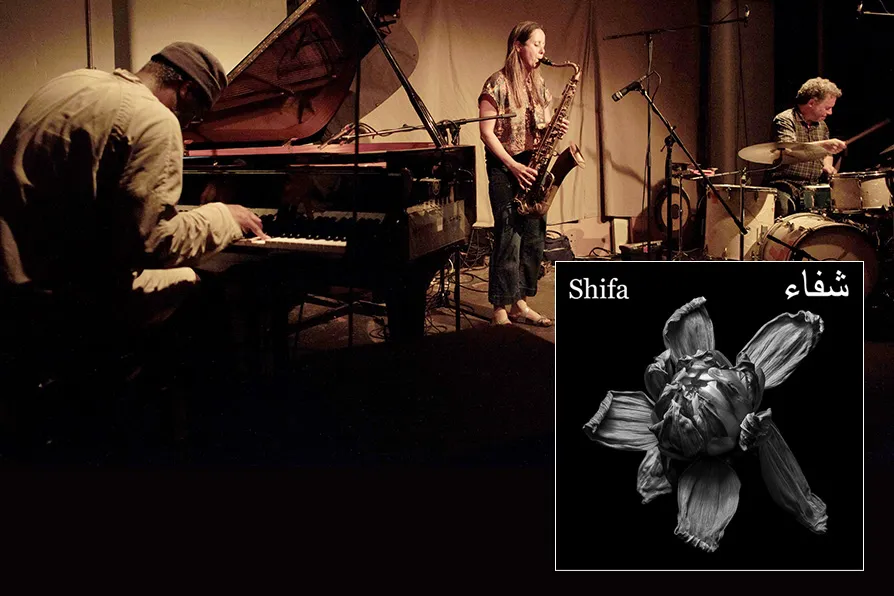RITA DI SANTO draws attention to a new film that features Ken Loach and Jeremy Corbyn, and their personal experience of media misrepresentation
Error message
An error occurred while searching, try again later.CHRIS SEARLE hears the ordeal of the Palestinian people in the improvised musicianship of a UK jazz trio

 Pat Thomas, Rachel Musson and Mark Sanders at Cafe Oto [Pic: Courtesy of Shifa]
Pat Thomas, Rachel Musson and Mark Sanders at Cafe Oto [Pic: Courtesy of Shifa]
Ecliptic
Shifa
(Discus Records)
★★★★★
A WELSH heritage saxophonist, an Antiguan heritage British pianist and an English-Belizian heritage drummer, improvising as a trio with an Arabic name — Shifa, meaning “healing,” and recorded in February 2023 at Cafe Oto, Dalston, east London, play a 46-minute sound creation called Ecliptic — the path of the sun.
The powerful music of Rachel Musson, Pat Thomas and Mark Sanders spans the world of sound with an astonishing and emotive virtuosity. I listened to their album immediately after watching a horrific newscast from the Gaza genocide and reading the words of Dr Nidal Jboor from the blitzed al-Shifa Hospital in Gaza City: “Bombed into ash, doctors and nurses killed in their white coats, and patients — children, elders. The wounded — left to die on the floors of ruins that once promised healing. More than 25,000 children exterminated, hospitals and schools flattened, doctors executed, patients burned alive, aid turned into bait, starvation used as weapons, cities erased.”
We hear the cry and the ordeal of the Palestinian people all through Shifa’s music, sometimes calm and serene, sometimes caustic and rasping, sometimes mollifying, sometimes irascible, always brilliantly played with instant, ever-inventive improvising, a musicianship which moves into every vein of the listener’s blood. The listener listens, imagines, interpretes and understands in what dramatist Edward Bond called “the art of the audience.”
Sanders’ riveting introduction is soon fused with Musson’s belching notes and Thomas’s first chinking, bell-like phrases. Then a hushed pause, some scuttling Sanders and Musson’s sustained tenor saxophone at its most piercing and pained alongside Thomas’s unbridled runs and Sanders’ omnipresent drums. We are away and the world of healing is upon us.
Somewhere among the multi-rhythms — the beauty of the quasi-melodic infusions, the spontaneous soundscape of real life from agony to hope, light and healing — Palestinian wilfulness, like this music, never gives up.
“We are always scared that any reconstruction in Gaza is a target,” says Dr Karameh Hawash Kuemmerle, a pediatric neurologist, yet he talks too of active plans to rebuild al-Shifa so its healing can take new life, including a new 80-bed west wing, even in the very crux of Israeli bombardment and deadly drones.
The Shifa trio comprise a pianist, drummer and hornplayer. In the poem by the late Palestinian laureate, Mahmoud Darwish, the protagonist is a “wandering guitar player” and Darwish writes of him: “I almost see him,/ Almost smell the blood on his strings./ I almost hear him/ Shouting like a storm:/ Listen:/ That’s the music of human flesh.”
All the oxymorons of sound rise and fall in Ecliptic’s sunlit passages, in the storytelling eyes of the beautiful children of Gaza — skeletal, foodless and maimed. Yet still Shifa’s music, theirs and ours, cries out to every different ear in hope and love for them and the healing of their future in their Palestine, their own life-land, their own hereafter signalled by Shifa’s healing sounds.










